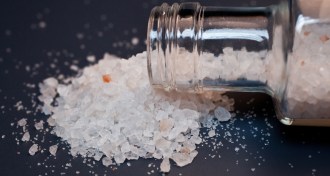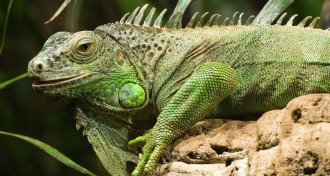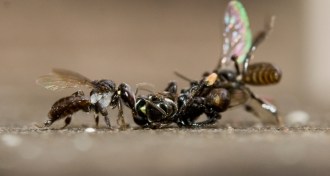Life
Sign up for our newsletter
We summarize the week's scientific breakthroughs every Thursday.
-
 Neuroscience
NeuroscienceAreas people like to be caressed match up with nerve fibers
A caress in a sweet spot at the right speed activates nerve fibers tied to social touch.
-
 Life
LifeSprings bring gecko stickiness to human scale
Springs of a stretchy alloy let gecko-inspired adhesives work at human scales to climb glass walls or grab space junk.
By Susan Milius -
 Neuroscience
NeuroscienceProtein production prevents sleep-loss forgetfulness
Boosting levels of certain proteins in mice prevented memory problems associated with sleep deprivation.
-
 Life
LifeTasty animals end up on latest list of threatened species
Growing food market lands several species, including Pacific bluefin tuna and Chinese pufferfish, on the IUCN Red List of Threatened Species.
-
 Neuroscience
NeuroscienceMold may mean bad news for the brain
Living with mold isn’t good for your lungs. A study in mice shows that mold exposure may also cause inflammation that is bad for the brain.
-
 Environment
EnvironmentDDT lingers in Michigan town
Decades after a plant manufacturing DDT shut down in Michigan, the harmful insecticide is still found in neighboring birds and eggs.
By Beth Mole -
 Neuroscience
Neuroscience‘Bath salts’ reduce communication in rat brains
The recreational drugs known as bath salts cause a loss of communication between areas in the rat brain.
-
 Life
LifeIguanas’ one-way airflow undermines usual view of lung evolution
Simple-looking structures create sophisticated one-way air flow in iguana lungs, undermining old scenarios of lung evolution.
By Susan Milius -
 Animals
AnimalsWhen sweet little bees go to war
Tiny Tetragonula bees don’t sting but have strong jaws. The bees fight by biting a combatant and not letting go.
By Susan Milius -
 Neuroscience
NeuroscienceMagnets in helmets might make football safer
The repulsive force of magnets in football helmets could slow the impact of collisions, reducing concussion danger and making the game safer.
-
 Environment
EnvironmentColorado deluge produced flood of drug-resistance genes
Flooding in Colorado’s South Platte River Basin washed antibiotics and drug-resistance genes into pristine waterways.
By Beth Mole -
 Archaeology
ArchaeologyFeedback
Readers ask questions about a study on sweeteners, how scientists recognize primitive tools and the purpose of a dinosaur's sail.